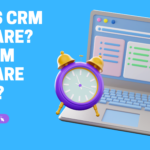Customer Relationship Management in the Service Sector
The service industry is built on maintaining long-term client relationships and high customer satisfaction. These primary goals are the reason why customer relationship management in the service sector is crucial. CRM software allows businesses to personalize customer services, anticipate customer needs, and offer support during busy times.
What Are the Capabilities of a CRM Platform?
So, what are the capabilities of a CRM platform? The answer varies from platform to platform, depending on its advancement. However, there are a few functionalities and tools provided with many CRM software:
- Lead Management: Concerns tracking sales leads and managing their distribution across the sales team.
- Customer Segmentation: Collects data to categorize customers based on purchase history, interactions, and demographics.
- Workflow Automation: Saves time and resources by automating repetitive daily tasks that are typically done manually by hourly workers.
4 Components of Customer Relationship Management
The components of Customer Relationship Management (CRM) are the core pieces of the system; they are the elements that give CRM software its capabilities:
- Customer Data Management: CRM systems effectively collect and organize data, which can be converted into a strategy to land more leads and sales.
- Interaction Tracking: CRM tracks all interactions between you and potential customers, advancing the data collection process.
- Pipeline Analytics: Tracks the process of making deals from start to finish, allowing your strategy to be recreated in the future.
- Business Reporting: Allows companies to make informed decisions with systematic collection, analysis, and presentation of data on business performance and operations.
Customer Relationship Management Software Features
Customer Relationship Management Software Features enhance every part of customer interaction. Take a look at these three important features of CRM systems:
- Contact Management: Allows companies to store all customer data in one cohesive place, better tracking and organizing interactions.
- Sales Pipeline Management: A visual representation of sales pipelines, helping teams track leads, opportunities, and deals in real time.
- Marketing Automation: Ensures that marketing efforts and customer outreach are achieved on a schedule.
List of CRM Systems
There is a lengthy list of CRM systems available to businesses today. However, not all these software are created equally. Take a look at a few of the most popular CRM systems that have been deemed reliable:
- Salesforce: The most used platform catering to all business branches, including sales, service, marketing, analytics, and more.
- HubSpot CRM: Allows companies to get started for free, with affordable upgrades available for more growth.
- Zoho CRM: Gives businesses a panoramic view of your business, tracks sales and marketing opportunities, and increases conversion rates.
- MLeads: The most powerful CRM system MLeads can boost conversions by up to 40% with its advanced capabilities.
If you are ready to boost your customer conversions, better client relationships, and improve performance, explore MLeads today! Our advanced CRM capabilities can enhance your strategies and drive conversions by 30-40%. Don’t miss out—start your journey towards smarter customer management now!












